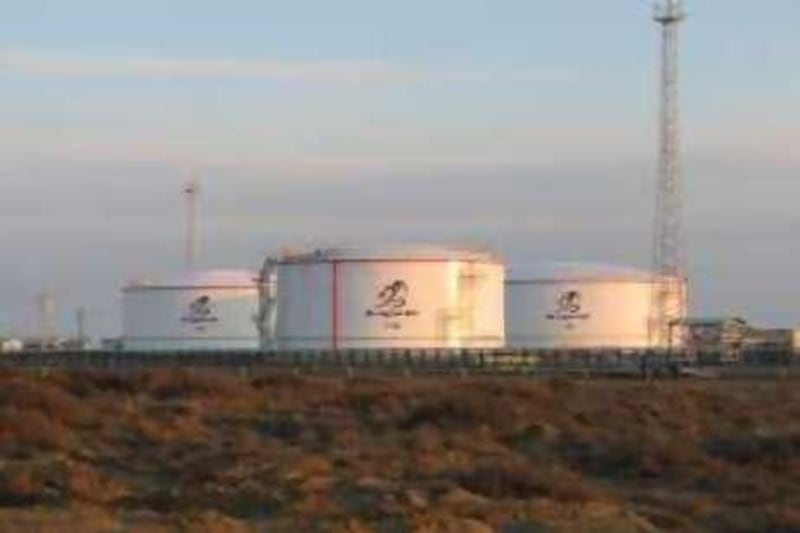Dragon Oil, a Dubai company with operations in Turkmenistan, has three main strategic goals, according to its executive chairman: achieve its oil production targets, start selling its gas production and diversify its operations. "Mission Accomplished" describes the company's progress this year towards the first of those goals. The second and third could prove more elusive.
"We are flaring 19 million cubic feet a day of gas, which is a shame," said Hussain Sultan, the executive chairman. "Environmentally and operationally, it is a big headache for us." The irony is that Turkmenistan, the least developed of central Asia's three energy exporting states, which also include Azerbaijan and Kazakhstan, is better known for pumping gas than oil. But all the country's gas exports are from its eastern region - from big deposits under the black sands of the Karakum Desert. Dragon, firmly ensconced in western Turkmenistan, where it has pumped oil and gas since 2001 from two revamped Soviet-era oilfields in the Caspian Sea under a 25-year production sharing contract, has no access to the country's gas-export pipelines. So the company's gas production goes to waste.
Dragon's problem exemplifies the main difficulty facing Turkmenistan as its government pushes forward plans to boost and modernise the country's economy by developing its significant energy reserves. Like its energy-rich neighbours in the Caspian region, Turkmenistan has an urgent need to develop more export routes for oil and gas so it can optimise sales and develop negotiating leverage for commercial contracts with regional powers such as Russia, China and Iran.
Turkmenistan has three pipelines for oil exports: one heading west through Azerbaijan, one north through Kazakhstan to Russia, and one south through Iran. Dragon exports about 80 per cent of its oil production through Iran. But Mr Sultan said the company is careful to keep all potential export routes open in case of future problems with Iran or other geopolitical turmoil, like Russia's recent invasion of Georgia, which blocked the westward flow of Caspian oil.
Compared to its neighbours, Turkmenistan is a late entrant to this game. Until just two years ago, it was ruled with an iron fist by a former communist party boss - Saparmurat Niazov, who styled himself "Turkmenbashi" or "chief of all the Turkmen" and built extravagant gilded monuments to himself, while keeping foreign investors at bay. Partly because of its relatively small size, non-Western ownership, and sensitivity to a tribal, mainly Muslim culture not too different from the UAE's own traditional culture, Dragon was nonetheless able to set up shop in the isolated country by offering to rescue an enterprise that was on the brink of bankruptcy. That was in 1998, when oil prices averaged about US$11 (Dh40.4) a barrel.
"It was a gamble for us, but one that paid off," said Mr Sultan, who is also the chief executive of Emirates National Oil Company, the Dubai state-owned petroleum refining and marketing company that holds 52 per cent of Dragon. The rest of Dragon, which has stock exchange listings in London and Ireland, is publicly held. On Friday, the company posted net profits of $166.9 million (Dh612.4m), up 34 per cent from $124.1m a year earlier. Revenue surged 63 per cent to $373.4m from $229.4m, while oil output reached 43,227 barrels per day (bd) in June, exceeding target production for the year of 40,000 bd.
Dragon said it plans to boost output a further 25 per cent next year, and it could achieve that in the next few months. "The company is on track to exit 2008 at 50,000 bd," according to Evolution Securities, a Chinese investment bank. Dragon's progress has been helped by a regime change in 2006 that brought Gurbanguly Berdymukhammedov to power as new the Turkmen president following Mr Niyazov's death.
Mr Berdymukhammedov is slowly opening Turkmenistan to foreign investment, and has allowed several Western oil companies, including Germany's Wintershall and Austria's OMV, to operate in the country. He has also made regular visits to Dragon's operations, Mr Sultan said, giving the company the opportunity to lobby the Turkmen government for a pipeline to carry Western gas. The meetings have been positive, but Dragon is still waiting for a government of support for the gas line. At the same time, there is talk of OMV backing a new oil pipeline between Turkmenistan and Azerbaijan. "In ten years' time, there will be many, many routes for oil and gas," predicts Mr Sultan. Dragon's rising profits and zero debt, meanwhile, have left the company in a strong position to pursue its diversification goal.
It is essentially a one-asset company, which Mr Sultan does not view as positive. Dragon began its diversification efforts in Yemen, and plans to drill some exploration prospects there next year. It is seeking additional assets in North Africa, the Caspian region or possibly eastern Asia. The company has been growing in other ways. In May, it recruited Abdul-Jaleel al Khalifa, a former Saudi-Aramco oil exploration and petroleum engineering manager, to take over the role of chief executive from Mr Sultan.
Continuing in the executive chairman role he had concurrently held, Dragon said Mr Sultan would focus his activities on corporate strategy, including diversifying the company's geographic positioning. In London on Friday, Dragon's shares closed at £3.27.5 (Dh22.3), up 15.5p or five per cent. @Email:tcarlisle@thenational.ae





